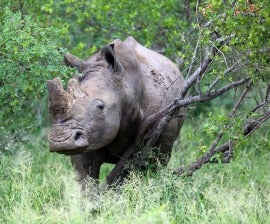
We’re working to save rhinos before they disappear. Vanessa Mignon
Demand for rhinoceros horn in Vietnam has decreased by 38 percent since the launch a year ago of a public education and awareness campaign jointly implemented by HSI and the Vietnam Convention on International Trade in Endangered Species of Wild Fauna and Flora (CITES) Management Authority, according to poll results released today.
CITES Parties had requested that the country—the world’s biggest consumer of rhino horn—implement a communication campaign to reduce demand for the substance, which is falsely believed by some to have medicinal properties.
Please donate to help us save rhinos and other wildlife.
The campaign focused on the capital city, Hanoi, and engaged stakeholder groups including the 800,000-member Hanoi Women’s Association, the business community, university students, school children, and the scientific community, as well as many leading health experts, to help spread messages against the use of rhino horns.
The young pupils received copies of HSI’s book, “I’m A Little Rhino,” as part of their curriculum. Advertisements also appeared on billboards within the city and at the airport, and on the sides of city busses. Campaign messages were further spread throughout Vietnam through hundreds of press articles.
Pre- and post-campaign polls conducted by the Vietnam office of the international public polling firm Nielsen revealed a dramatic reduction in public demand since the campaign’s inception:
- Only 2.6 percent of people in Vietnam continue to buy and use rhino horn, a statistically significant decrease of 38 percent since the campaign started in August 2013.
- An even more dramatic decline in people in Hanoi (where the campaign was most concentrated) buying and using rhino horn, down from 4.5 percent to 1 percent.
- Only 38 percent of the national population (down from 51 percent last year) and 21 percent of people in Hanoi city (down from 45 percent last year) continue to think that rhino horn has medical value.
- Of those polled who still think rhino horn can treat diseases, 60 percent believe it can treat cancer and 40 percent believe it is good for rheumatism.
Teresa M. Telecky, Ph.D., director of the wildlife department for HSI, said, “Insatiable demand for rhino horn is driving rhinos to the brink of extinction, so reducing that demand is absolutely crucial. These poll results demonstrate that, even in a relatively short period of time, our demand reduction campaign has succeeded in significantly and dramatically altering public perception and influenced behavior. The results offer a vital ray of hope for the survival of rhinos.” Please give to help us achieve more victories for animals.
Media Contact: Raúl Arce-Contreras, rcontreras@humanesociety.org, +1 240.620.3263
Read the full press release.
View a PDF with photos and further details.
